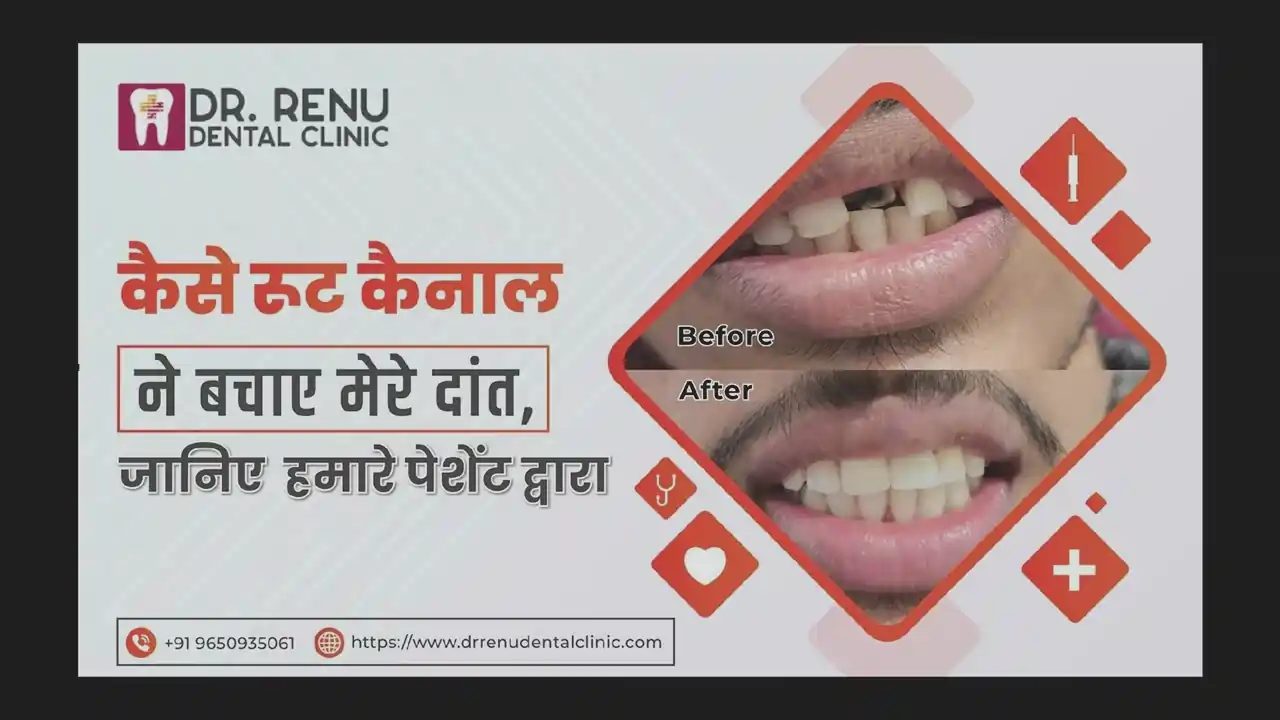Call us
+919650935061Address
Nirman Nagar, JaipurGoogle Rating
5.0( 607+ Reviews )

Overview
What is a Root Canal?

Overview
What is a Root Canal?
A root canal refers to a dental treatment for an infected portion of the tooth called the pulp. The pulp is the innermost part of the tooth, which is also the most sensitive portion as well. Typically, in the root canal treatment in Jaipur, the innermost portion of the inflamed pulp is removed and sealed up with other materials, such as composite filling. These infections occur mostly due to cavities or any similar bacteria buildup around the tooth, which grows into the pulp of it. Dentists use X-ray imaging to detect the infection and then perform the root canal procedure on the affected portion. Afterwards, dental crowns or permanent fillings are used to secure the area and add strength to the tooth.
Signs That you Need
What are the Signs That you Need to get a Root Canal Treatment?
Knowing when to get a root canal treatment in Jaipur can help you treat the affected tooth before the pain increases. Thus, here are some common signs that indicate if you need root canal treatment:
Constant Tooth Pain
Tooth pain, which prevails for a prolonged period in your mouth, should not be ignored. This could either be a sign of a bacterial infection or relate to another such problem. In either case, you should consult a dentist and get treated.
Pressure Hurts
If your teeth hurt or feel sensitive when you apply pressure while biting or grinding them, it could be a sign of a deeper issue. Most of the time, this issue is related to an infection in the pulp of the teeth. If so, a root canal can save the day.
Swollen Gums
Gums that appear red and swollen are not normal. At times, they may also feel tender around affected teeth. Oftentimes, these issues are related to an infected pulp of the tooth requiring a root canal.

Loose Tooth
Loose teeth in adulthood are not common. They may be caused by a buildup of bacteria or an infection of the tooth's pulp. A root canal treatment can rectify the situation by disinfecting and sealing the pulp.
Swollen Jaw
Swollen and painful jaw are not a problem you should ignore. Most cases of jaw pain relate to tooth issues. With simple imaging tests, your dentist will be able to find the affected tooth and perform a root canal to settle the issue.
Boils on Gums
Small, pus-filled boils sometimes appear on the gums around the affected teeth. If they are related to pulp infections, your dentist may perform a root canal treatment to treat the affected tooth and reduce the occurrence of boils.

Constant Tooth Pain
Tooth pain, which prevails for a prolonged period in your mouth, should not be ignored. This could either be a sign of a bacterial infection or relate to another such problem. In either case, you should consult a dentist and get treated.
Pressure Hurts
If your teeth hurt or feel sensitive when you apply pressure while biting or grinding them, it could be a sign of a deeper issue. Most of the time, this issue is related to an infection in the pulp of the teeth. If so, a root canal can save the day.
Swollen Gums
Gums that appear red and swollen are not normal. At times, they may also feel tender around affected teeth. Oftentimes, these issues are related to an infected pulp of the tooth requiring a root canal.
Loose Tooth
Loose teeth in adulthood are not common. They may be caused by a buildup of bacteria or an infection of the tooth's pulp. A root canal treatment can rectify the situation by disinfecting and sealing the pulp.
Swollen Jaw
Swollen and painful jaw are not a problem you should ignore. Most cases of jaw pain relate to tooth issues. With simple imaging tests, your dentist will be able to find the affected tooth and perform a root canal to settle the issue.
Boils on Gums
Small, pus-filled boils sometimes appear on the gums around the affected teeth. If they are related to pulp infections, your dentist may perform a root canal treatment to treat the affected tooth and reduce the occurrence of boils.
Health Tips
Your Guide to a Healthier Smile
Our health tips video is given below which gives you a guide and practical advice to maintain a healthy smile. Learn expert tips from Dr. Renu on oral hygiene, preventive care, and nutrition to keep your teeth strong and bright every day.

15+ Years of Experience

Meet Our Doctor
Dr. Renu Chaudhary
BDS, MDS & PGCOI(PGI)
Dr. Renu Chaudhary is an accomplished consultant prosthodontist and dental implantologist with over 15 years of expertise in both cosmetic and general dentistry. She has a BDS, an MDS, and a postgraduate diploma in implants from PGI. Dr. Chaudhary has spent more than six years of her career helping patients in South Delhi and currently practices full-time at Dr. Renu Dental Clinic in Jaipur.
Dr. Chaudhary offers a wide range of dental services at Dr Renu Dental Clinic, including root canal therapy, dental implants, crowns and bridges, dentures of various types, tooth-coloured fillings, paediatric dentistry, and preventive dentistry. Her dedication to patient happiness is demonstrated by the over 10,000 satisfied patients and more than 20,000 dental operations she has performed, including over 1,000 smile makeovers.
20K+
Dental Procedures
10K+
Smile Makeovers
20K+
Happy Patients
Why Choose
Why Choose Dr. Renu Dental Clinic for Root Canal Treatment?
Dr. Renu Dental Clinic has a well-renowned reputation as a top dental clinic in Jaipur. Here are the reasons why she is one of the top-most choices for dental treatments:
Experience and Expertise
Dr. Renu Chaudhary, a well-known consultant prosthodontist and dental implantologist, has over 15 years of experience in dentistry. With thousands of successful surgeries, she assures that root canal treatments are handled expertly, with precision and patient comfort as top priorities. Her experience ensures you get the best care with long-term results.
State-of-art Technology and Advanced Clinic
Our root canal treatment clinic in Jaipur uses advanced equipment, such as laser-assisted endodontists, which allows for faster and more efficient procedures. This new technology improves precision, reduces discomfort, and frequently provides for single-session therapies, avoiding the need for several visits and increasing the overall success rate of the surgery.
High Success Rate
Our clinic provides efficient and dependable service, with a 95% success rate in performing single-sitting root canals in Jaipur. This results in fewer visits, less stress, and faster pain relief, making it an excellent alternative for busy people looking for a quick and efficient solution to their dental problems.
Experience and Expertise
Dr. Renu Chaudhary, a well-known consultant prosthodontist and dental implantologist, has over 15 years of experience in dentistry. With thousands of successful surgeries, she assures that root canal treatments are handled expertly, with precision and patient comfort as top priorities. Her experience ensures you get the best care with long-term results.
State-of-art Technology and Advanced Clinic
Our root canal treatment clinic in Jaipur uses advanced equipment, such as laser-assisted endodontists, which allows for faster and more efficient procedures. This new technology improves precision, reduces discomfort, and frequently provides for single-session therapies, avoiding the need for several visits and increasing the overall success rate of the surgery.
High Success Rate
Our clinic provides efficient and dependable service, with a 95% success rate in performing single-sitting root canals in Jaipur. This results in fewer visits, less stress, and faster pain relief, making it an excellent alternative for busy people looking for a quick and efficient solution to their dental problems.
What is the Procedure for Root Canal Treatment?
Root canals are tedious procedures performed on patients with inflamed pulps. They relieve tooth pain by removing the innermost portion of the tooth. Here is the step-by-step process of root canal treatment in Jaipur:
- 1. Numbing the Area
Your dentist starts by administering anaesthesia to numb the infected part of your mouth, including the affected teeth and gum. Certain medications will also relieve pain during the entire procedure.
- 2. Drilling a Hole
The dentist will then tie a thin, flexible piece of rubber around your affected tooth to keep it dry. A hole will be drilled into the crown to reach the innermost part of the tooth. Once the pulp is reached, the dentist will carefully remove blood vessels, tissues, and nerves from there.
- 3. Filling up the Space
The pulp chamber will be cleared up and disinfected. Your dentist will then use a dental filling to seal up the space. This filing ensures that the bacteria does not reach your teeth.
- 4. Using Dental Crown
In the final step of the procedure, your dentist will place a dental crown on the treated tooth. These crowns are artificial covers over your teeth, which protect your teeth and perfect your bite. These crowns are usually made a few weeks before your pulp removal.
What are the Things to Know Before you get Root Canal Treatment?
Root canal treatment in Jaipur is performed widely to relieve pain in the infected teeth and cure the cavities in the pulp. There are certain things, however, to note before you get your root canal treatment at the right time:
- 1. Root Canal Removes Nerves from the Tooth
A root canal treatment in Jaipur is done to remove the nerves and tissues from the innermost part of the tooth, which is called pulp. When the infection reaches the core or the pulp, the pain you feel will be intense. However, a damaged pulp cannot repair itself and will need nerves removed.
- 2. Use of Anaesthetics
Root canal treatment involves treating the pulp of teeth, which can cause sensitivity. Anaesthetics are injected into the gums of the affected teeth to numb the area while treating it. This can cause mild discomfort.
- 3. Dental Crown is Required
Once the operation is complete and the nerves and tissues in the pulp are removed and sealed, your dentist will apply dental crowns. These artificially made teeth-shaped covers provide additional strength and durability to the treated teeth.
- 4. Do not eat Restricted Food items
After getting a root canal treatment, your dentist will provide you with a list of items you are not allowed to eat. The list usually comprises hard, crunchy, and sticky foods that you should avoid for a few days while softer foods are permitted.
- 5. Permanent Filling in the Next Sitting
When you get your root canal done, your dentist will put on a temporary filling material to seal the tooth. The permanent filling for the same matter is typically applied in the next sitting. Your dentist will set up an appointment for the same or the following week.
- 6. Painless Procedure
The procedure of getting a root canal does not hurt at all. You are given anaesthetics before the treatment starts, and you will barely feel anything before it gets done. It, in fact, is a pain-relieving procedure.
What are the Benefits of Root Canal Treatment?
Painless root canals in Jaipur offer several benefits to patients, including relieving pain and securing tooth health for prolonged periods. Here are some other benefits of the procedure:
- 1. Pain Relief
When a tooth infection spreads to the pulp, the pain can be terrible. A root canal removes contaminated tissue, disinfects the tooth, and closes it, resulting in instant pain relief. Because of contemporary anaesthesia procedures, patients experience little to no pain during the surgery.
- 2. Helps in Saving Tooth
If your teeth are infected to the pulp, you can either remove them or perform a root canal to stop the pain. In a root canal procedure, your teeth are not removed or extracted. Your dentist ensures that the infection is treated and that the teeth are intact after the procedure.
- 3. Cheaper Alternative to Expensive Implants
Root canals are a cheaper but more effective option for relieving pain and saving an infected tooth. They are also an alternative to rather expensive implants, which are required once the tooth is removed. Hence, they save a lot of money.
- 4. Infected Spread is Stopped
Untreated infections can spread to neighbouring teeth, gums, and even the jawbone, resulting in serious consequences. A root canal removes the infection, preventing additional damage and safeguarding your oral health.
- 5. Avoiding Future Problems
In the root canal treatment in Jaipur, the pulp of the tooth is removed and then sealed off using a dental filling. This prevents future issues, such as total loss and further pain in the affected area.
- 6. Restores Normal Function
When your pulp is infected, even moving your jaw and biting on something in the area radiates pain. This affects how you use your teeth and jaw. Getting a root canal ensures that the area is pain-free and restored to normal.
Transform Your Smile with Expert Dental Care!
Let’s Request a Schedule For Consultation
Book AppointmentWhat to Expect During Root Canal Treatment?
Root canal treatments in Jaipur are extremely effective and have high success rates. Here is what to expect during the procedure of the root canal therapy:
- 1. Long Duration of Treatment
It is a precise procedure that requires time to ensure its effectiveness. The procedure starts with imaging to determine the severity of the infection. Once the treatment begins, each session might last anywhere from 30 minutes to an hour per tooth, depending on its state.
- 2. Use of Anesthetics
Before the treatment begins, a local anaesthetic is delivered to the patient to ensure their comfort. This numbs the afflicted tooth and the surrounding gum tissue, avoiding pain during the procedure. You will remain conscious but will not feel any discomfort.
- 3. Pulp is Removed
Root canal treatment removes the diseased or injured pulp within the tooth. When the pulp becomes infected, it causes severe discomfort. To prevent further infection, the dentist gently removes the pulp, cleans the root canals, and disinfects the tooth’s inner chamber.
- 4. Cleaning and Disinfecting
After the pulp is treated, it is cleaned and disinfected properly to ensure that the infection disappears completely. This is done with proper washing, followed by temporary filling to secure the space.
- 5. Permanent Filling
In the subsequent appointment, your dentist uses a permanent filling or dental crown to restore the durability of your teeth. Moreover, permanent fillings take less time than root canal treatment.
- 6. Post-Recovery
Mild soreness or sensitivity after the surgery is normal and usually goes away after a few days. Your dentist may also prescribe relief or antibiotics based on your case. Maintaining proper oral hygiene and following your dentist’s advice will all aid in a smooth recovery.
When Should you go to a Doctor for Root Canal Treatment?
Knowing when to see a dentist for a root canal treatment in Jaipur is critical to avoiding complications and preserving your natural teeth. Delays in getting treatment can result in severe illnesses and invasive procedures. Here are details regarding when to see your doctor:
- 1. You Have Cavities
Cavities can grow deep and reach the pulp of your teeth, damaging. Thus, if you happen to have cavities, it is essential to get them treated fast. Moreover, you can get x-ray images of your teeth to know how deep the cavities run.
- 2. There is Tooth Pain
If you have prevailing tooth pain, it could mean something serious requiring immediate medical attention. In such a case, consulting a dentist is the best thing to do. If advised, you can then proceed with root canal treatment.
- 3. You Have Damaged Teeth
A fractured or broken tooth creates an easy entry point for bacteria, which can infect the pulp. Even if the crack is not noticeable, it may expose nerves, causing sensitivity and pain. Untreated damage can eventually lead to an abscess, necessitating immediate dental care.
- 4. Pain While Chewing
Pain in your teeth while chewing or biting down on food is not common, and neither is it a sign of a healthy tooth. A checkup with your dentist can help in the early detection of the underlying issue and help you resolve it faster.
How is a Root Canal Treatment Different From Extraction?
Root canal treatment in Jaipur is sometimes confused with tooth extraction. While both perform the same function of relieving pain and getting rid of the infection, the procedures are different. Here are the differences:
| Aspect | Root Canal Treatment | Extraction |
|---|---|---|
| Definition | Includes treating the pulp of the tooth and sealing it. | Refers to complete removal of the tooth. |
| Cost | It is generally an affordable solution. | It costs way more than a root canal. |
| Procedure Time | Takes longer, like 30 minutes, for one tooth. | It is done faster and under a minute. |
| Repeat Treatments | Sometimes, you may require 1-2 root canal treatments if the first was not successful. | It is done only once for a certain tooth. |
| Aesthetic Appeal | The aesthetic appeal of the teeth is preserved. | You may later require implants to fill in the missing tooth gap. |
| Functionality | Keeps the tooth functioning like normal. | You lose the tooth, which affects the bite. |
What Happens After a Root Canal Treatment?
Once the dentist completes the root canal treatment in Jaipur, the pulp will be cleared and sealed. You will be advised to sit back and relax for some time before the anaesthesia wears off. This could take an hour or more. You can also ask your dentist permission to go home and rest.
Then, you will have two more appointments in the following days and weeks to have a dental crown. Many people also order a dental crown before the treatment and receive the crown earlier than others. In most cases, the crown arrives a week after the dental impressions are taken. You will, thus, have to go to your dentist to get it on your teeth.
How to Take Care of Yourself After Root Canal Treatment?
Taking care of yourself after root canal treatment in Jaipur is essential to ensure that the newly put-on permanent filling and the dental crown remain undamaged. Here are some tips for effective maintenance:
- 1. Eat Soft Foods
Following a root canal, your tooth and surrounding gums may feel tender. Eat soft foods that require less chewing, such as yoghurt, soups, and smoothies. Avoid particularly hot, hard, or crunchy foods, as they can put pressure on the treated tooth and damage the filling or dental crown. Maintain a soft diet for at least a few days to aid in mending.
- 2. Avoid Chewing on the Treated Tooth
The treated tooth may be sensitive for a few days. Avoid biting on that side of your mouth to facilitate normal healing and reduce unnecessary strain on the replaced tooth. Give your tooth at least 24 to 48 hours before chewing to reduce stress and allow the filling or crown to settle completely.
- 3. Avoid Smoking
Smoking can drastically impede the healing process and raise the risk of infection. Tobacco products restrict blood flow to the gums, which can jeopardise the treated tooth’s long-term stability. If possible, avoid smoking for at least a few days after therapy, and consider quitting smoking to improve your overall oral health.
- 4. Properly Brush and Floss
Keeping your mouth clean after a root canal is critical. Brush your teeth twice a day with a soft-bristled toothbrush and non-abrasive toothpaste. Be gentle around the treated area to avoid irritation. Floss every day, but do not disturb the temporary filling or newly placed crown. A thorough dental practice will help prevent reinfection.
- 5. Use Antibacterial Mouthwash
Your mouth is more prone to bacterial development and illness following a root canal. Using an antibacterial or dentist-approved mouthwash can help keep it clean and clear of hazardous microorganisms. Rinse carefully to avoid aggravating the treated area, and incorporate it into your normal hygiene routine to minimise future difficulties.
- 6. Visit Your Dentist Regularly
Mild soreness and sensitivity following a root canal treatment in Jaipur are usual. To treat soreness, your dentist may prescribe painkillers or recommend over-the-counter medications. Applying a cold compress to the outside of your cheek near the treated area can also help with swelling. If the discomfort lasts more than a few days or worsens, contact your dentist immediately.
What are the Common Myths About Root Canal Treatment?
Root canal treatment in Jaipur is sometimes associated with certain misbeliefs that keep people from opting for this treatment. Here are some of those common myths about the root canal treatments:
1. Root Canals are Painful
Root canals are not painful, and you will most likely undergo the procedure under anaesthetics. Although you may feel a little pressure, absolutely no pain accompanies the procedure or the post-surgical period.
2. Root Canals Make You Sick
Root canals do not make anyone sick. You will get certain medications to get rid of the mild discomfort which remains after surgery. But apart from the discomfort, this process does not make you sick.
3. Cavities do not Require Root Canals
Cavities can sometimes reach the pulp of the teeth, damaging the nerves and inner portion of the teeth. In such scenarios, a root canal is the most appropriate solution to relieve pain and infection.
4. Require Long Appointments
Root canals do not require long appointments. Dentists such as Dr. Renu are readily available to treat root canals only after a short visit for imaging tests. Then, the treatment is concluded within one or two sittings.
5. Extractions are Better
Extractions have their own benefits. But root canals offer you a restored tooth that can go back to functioning like before, except without being painful. It also allows you to retain your oral aesthetic.
6. Root Canal Leaves the Tooth Dysfunctional
Root canals can momentarily weaken teeth because nerves are cut out of the pulp. However, dental crowns and permanent fillings secure the tooth and provide durability, allowing it to function normally.
How Long Does Root Canal Treatment Last?
A root canal treatment in Jaipur lasts for over a decade, some even going up to 15 years. In addition, root canals, once done on the tooth, are irreversible and generally do not require additional repairs. In such cases, they may even last a lifetime.
Root canals have a success rate of over 95%. They also require permanent restoration processes such as fillings or crowns. With good oral hygiene and regular checkups, a root canal can easily last a long time without damage.
What are the Dos and Don'ts of Root Canal Treatment?
After getting a root canal treatment in Jaipur, your dentist will let you know certain dos and don’ts. You must keep these in mind to ensure you have an effective treatment. Here are some of them:
| Do’s | Don’t’s |
|---|---|
| Carefully brush your treated tooth regularly. | Do not bite or chew on the affected tooth until the dental crown is on. |
| Have soft food like rice and porridge. | Avoid drinking hot or cold drinks immediately after treatment. |
| Have your medications on time and as per the prescription. | Until the numbness after the treatment wears off, do not eat anything. |
| Go for saline gargles, which help you heal faster. | Avoid smoking and drinking with medications on. |
| In case of any swelling, contact your dentist. | Do not delay in getting the dental crown on. |
| Visit your dentist regularly for routine check-ups. | Do not delay or avoid taking the medications prescribed. |
What are the Limitations of Root Canal Treatment?
Root canal treatment in Jaipur offers many benefits, such as relieving pain and restoring tooth and gum health. However, there are certain limitations to this procedure. They are:
- 1. Not Always Successful
A root canal treatment, though 90-95% successful, is not always able to clear out the infection. If your treatment does not get rid of the treatment fully, your dentist may ask you to go through another root canal surgery.
- 2. Tedious Maintenance
Root canal treatment often requires tedious maintenance, including taking medications on time and maintaining good oral hygiene. You are also required to visit your dentist at regular intervals to ensure your tooth is in good condition.
- 3. Tooth Loss
Sometimes, despite having a successful root canal treatment done on a tooth, it could bear severe damage. If your dentist detects structural damage to the tooth, a tooth extension or removal will be suggested.
- 4. Tooth Weakening
Once your teeth undergo a root canal treatment, their nerves and living tissues are taken out. This weakens them and makes it hard for you to chew on hard food items. You may require dental crowns for additional support and protection for the teeth.
Cost of Getting Root Canal Treatment in Jaipur
Root canal treatment in Jaipur is a low-price procedure for severe dental decays. Typically, the root canal treatment cost in Jaipur ranges between ₹3500 to ₹8,000 for each tooth. The variations in the prices depend on several factors, such as:
1. Tooth Type
Root canal treatments for front teeth usually cost less than those for back teeth, such as molars and premolars. Treatments for front teeth can cost between ₹3,500 and ₹4,000 whereas molars cost between ₹4,000 and ₹8,000.
2. Dentist’s Expertise
The dentist’s professional experience in dental surgery determines the price charged for the treatment. The more experienced the dentist, the higher the price you will have to pay. Dr. Renu Chaudhary is the best root canal treatment doctor in Jaipur and has 15 years of experience.
3. Number of Teeth
The cost of a root canal is assessed by tooth; thus, the more teeth that need treatment, the greater the total cost. If several teeth are impacted, your dentist will examine each one and provide an itemised cost breakdown.
4. Clinic’s Location
The location of a dental clinic has a considerable impact on the cost of root canal therapy. Clinics in metropolitan locations generally charge more because of higher operational costs and access to advanced facilities. However, we are the best dental clinic in Jaipur for RCT, and we use the latest technology while ensuring affordability without sacrificing care.
Myth & Fact
What are the Common Myths About Root Canal Treatment?
Root canal treatment in Jaipur is sometimes associated with certain misbeliefs that keep people from opting for this treatment. Here are some of those common myths about the root canal treatments:
Myth : Root Canals are Painful
Fact: Root canals are not painful, and you will most likely undergo the procedure under anaesthetics. Although you may feel a little pressure, absolutely no pain accompanies the procedure or the post-surgical period.
Myth : Root Canals Make You Sick
Fact: Root canals do not make anyone sick. You will get certain medications to get rid of the mild discomfort which remains after surgery. But apart from the discomfort, this process does not make you sick.
Myth : Cavities do not Require Root Canals
Fact: Cavities can sometimes reach the pulp of the teeth, damaging the nerves and inner portion of the teeth. In such scenarios, a root canal is the most appropriate solution to relieve pain and infection.
Myth : Require Long Appointments
Fact: Root canals do not require long appointments. Dentists such as Dr. Renu are readily available to treat root canals only after a short visit for imaging tests. Then, the treatment is concluded within one or two sittings.
Myth : Extractions are Better
Fact: Extractions have their own benefits. But root canals offer you a restored tooth that can go back to functioning like before, except without being painful. It also allows you to retain your oral aesthetic.
Myth : Root Canal Leaves the Tooth Dysfunctional
Fact: Root canals can momentarily weaken teeth because nerves are cut out of the pulp. However, dental crowns and permanent fillings secure the tooth and provide durability, allowing it to function normally.
Testimonial (Google Reviews)
Patient Feedback on Google
Here is what our happy patients say on Google about Dr. Renu Dental & Multi Speciality services their visit experience and the results of offered treatments.
Vipin Khandelwal
I had an excellent experience at Dr. Renu Dental Clinic. The staff is incredibly friendly and professional, creating a welcoming and comfortable environment. Dr. Renu's expertise and gentle approach made the treatment smooth and pain-free. They take the time to explain procedures and answer questions, which is truly reassuring. Highly recommend this clinic for anyone seeking quality dental care!
Anshul Kayath
It was really a good experience at Dr. Renu's dental clinic. She treated our daughter's tooth cavity and pulpotomy done by her was painless. Best dental clinic in the area.
V.K h.k
I visited Dr. Renu Dental Clinic for a teeth whitening and smile makeover and couldn’t be happier with the results. Dr. Renu is the best cosmetic dentist in Jaipur, and her attention to detail is impeccable. My teeth are now brighter, and my smile looks better than ever. I highly recommend Dr. Renu for cosmetic dentistry services.
Jyoti
I recently had a root canal procedure and capping of the tooth done at Dr Renu's dental clinic, and I couldn’t be more pleased with the experience. Dr. Renu and her entire staff were exceptional. From the moment I walked in, I was greeted with warmth and professionalism. The procedure was explained thoroughly, and Dr. Renu ensured I was comfortable throughout. The entire team demonstrated great expertise and care, making a potentially stressful experience quite pleasant. The follow-up care has been impeccable, and I’m delighted with the results. I highly recommend Dr.Renu and her team for anyone seeking top-notch dental care."
FAQs
Everything You Need to Know
At our clinic, patient satisfaction and trust are our top priorities. Dr. Renu Chaudhary.
Root canal treatment in Jaipur is a procedure to save a severely infected or decayed tooth. If you have severe tooth pain, sensitivity, or swelling, a root canal treatment specialist in Jaipur can help restore your tooth without extraction.
A root canal procedure includes the removal of nerves, tissues and other living parts of a tooth from its pulp. This is done on infected pulp to preserve the tooth and mitigate pain.
Yes! Dr. Renu root canal specialist in Jaipur offers single-sitting root canal treatment, reducing multiple visits while ensuring quick recovery.
It is generally advised to wait a few hours, preferably a few days, before eating after a root canal treatment. The anaesthetic should also wear down before you start eating again.
Many root canals last about a decade and can even last 15 years without needing further repair. However, oral health maintenance is necessary to ensure that root canal treatments last for a long time without any issues.
Side effects such as mild pain and subtle swelling are common after a root canal treatment. However, if this discomfort persists, you may have to see a dentist.
Root canal treatments usually cost between ₹3500 and 8,000 in India, depending on the tooth type and the number of teeth. In addition, the location of the clinic and other factors influence the treatment cost too.
No, with modern anesthesia and advanced techniques, a painless root canal in Jaipur is possible. At Dr. Renu Dental Clinic, we ensure a comfortable and stress-free experience.
Brushing directly on the treated tooth is advised against. However, since maintaining oral hygiene is important, you should brush and floss regularly.
Yes, teeth do become weaker after a root canal since, during the procedure, nerves and tissues are removed from the teeth. However, dental crowns are provided to support the teeth.
Dr. Renu Dental Clinic is recognized as the best dental clinic in Jaipur for RCT, offering painless root canal in Jaipur with advanced techniques and modern equipment.
The root canal treatment cost in Jaipur depends on factors like: Severity of infection Tooth location (front or molar) Number of sittings required For an affordable root canal in Jaipur, consult Dr. Renu, a leading root canal treatment doctor in Jaipur.
If you are looking for a root canal treatment hospital in Jaipur, visit Dr. Renu Dental Clinic, known for specialized endodontic care, advanced RCT procedures, and expert dental services.















 Facebook
Facebook
 Instagram
Instagram